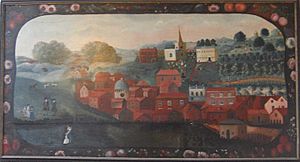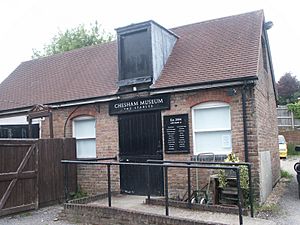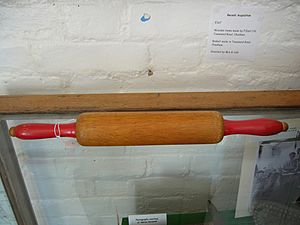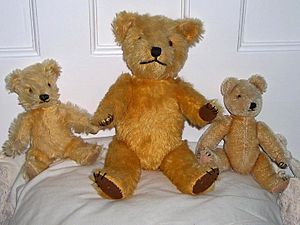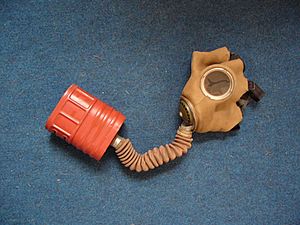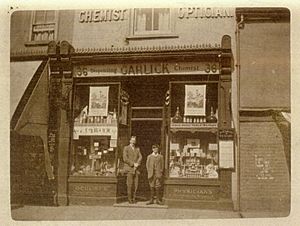Chesham Museum facts for kids
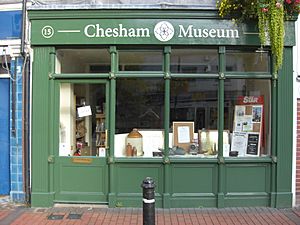 |
|
| Established | 2004, relocated October 2009, relocated again in 2024 |
|---|---|
| Location | Town Hall, Parsonage Lane Chesham, Buckinghamshire HP5 1EP, England |
| Type | Private, Community and local history museum |
Chesham Museum is a cool place in Chesham, Buckinghamshire, England. It's run by amazing volunteers. This museum first opened its doors in 2004 in a temporary spot called 'The Stables'.
Later, in October 2009, the museum moved to the town's Market Square. After being closed for a few years, Chesham Museum reopened in January 2024. You can now find it in the Chesham Town Hall. The museum has lots of old items and photos. These show the history of Chesham and the areas nearby.
Contents
Discovering Chesham's Past
The idea for a museum started way back in 1981. A local historian and councillor named Arnold Baines suggested it. A group called The Francis Trust first raised money to fix an old painting. This painting is known as the Town Picture. After that, the Trust's volunteers decided to create a town museum.
It was tough at first to get the museum going. There wasn't much official help to raise money or find a good place. In 1991, the Town Museum Project began. For ten years, starting in 1992, a dedicated team worked hard. They created 38 temporary displays in a special cabinet at Chesham Library.
These displays covered many interesting topics. Some were about Chesham's old industries. Others celebrated national and local events. There was even a series about important people from Chesham. These included the Liberty and Lowndes families. The team also gave talks and held fundraising events. They even made a newsletter for friends of the museum. But with limited money, it was hard to find a permanent home. The collection of items donated by local people kept growing fast.
In 2003, the Town Museum Project finished. But some of the original members joined with the owner of the Gamekeepers Lodge. This person offered a temporary space in a stable building behind the pub. The museum, in 'The Stables', first opened to the public in 2004. Because the space was small, the museum showed different themed displays. This way, visitors could see as much of the collection as possible.
In 2008, the museum's leaders announced a plan. They wanted to move to a bigger place in the Market Square. This new spot, No 15 Market Square, is a very old building. It was built in the 17th century or even earlier. The museum closed its temporary home at The Stables in November 2008. This was to prepare for the move. The campaign successfully raised money. This allowed the museum to get the lease for the new building in August 2009. The museum reopened on October 6, 2009. After being closed for several years from June 2018, it reopened in Chesham Town Hall in January 2024.
What You Can See at the Museum
The museum mainly focuses on Chesham's social life, culture, religion, and industries. It has a large collection about social history. This includes over 700 photos, audio and video recordings, and old items. These tell stories about Chesham's unique religious history. They also show the impact of important families. You can learn about the early days of Chesham's services. These include the fire brigade and the local hospital.
These stories are shown through five main displays:
- Made in Chesham
- Chesham at War
- Coming to Chesham
- Digging up the Past
- Remember Chesham
Made in Chesham: Local Products and Industries
This display has many different items. You can see tools used by craftspeople, manufactured goods, and toys. These show how Chesham's traditional industries changed over time. These industries included making boots and shoes, brushes, wooden items, and brewing beer. The exhibits show how small home businesses grew into large Victorian factories.
In the early 1900s, Chesham was a busy industrial town. Many different products were made there. These included handbags, pencils, teddy bears, aircraft seats, flags, and aluminum foil. The museum shows how these factories grew. Then, in the second half of the 1900s, they slowly closed down. New businesses took their place. These new businesses were in areas like medicine, computers, and engineering.
Chesham at War: Life During Conflict
The museum also has many pictures from the 1900s. These show daily life in Chesham during wartime. They show how the First and Second World Wars affected people and the town. You can also see who left Chesham to fight. Displays include gas masks given to adults and children. You can learn about the work of Air Raid Wardens. The museum also shows how ration cards and growing vegetables became part of everyone's life.
Coming to Chesham: People's Journeys
This section tells the story of how people came to Chesham. Over the years, people arrived for many reasons. For example, some came because of changes in religion. Others were evacuees during the Second World War. In the 1950s, some came for jobs that needed skilled workers. More recently, people have arrived from the Commonwealth. This story is told through pictures, interviews, and special items.
Digging up the Past: Archaeology in Chesham
You can see some of the things found from archaeological digs. These digs have helped us learn a lot about Chesham's past. The museum also shows old maps and surveys. It has displayed very old items from Chesham. These include a Bronze Age bowl from the Alps. These items are now kept at the County Museum in Aylesbury.
Remember Chesham: Local Memories
Another important project is collecting stories from long-time residents. They record what people remember about the town. These audio and video recordings, photos, and documents show how things have changed. They also show what has stayed the same in recent times.
Special Exhibitions and Online Information
The museum has a special area for temporary exhibitions. These change each spring and autumn. In autumn 2009, the first exhibition at the new location was called Pastimes and Pleasure. It told the story of entertainment in Chesham. This included everything from local plays to radio and television. Other exhibitions in 2010 included House & Home, about housing in Chesham. There was also Chesham Girl Guides 1915-2010 Celebrations. In 2011, there was an exhibition called Medieval Chesham. Later in 2011, the exhibits were about the Watercress Industry in the Chess Valley. In 2012, exhibitions covered Sports and Recreation and Brewing in Chesham.
A Museum for the Community
Since it started, the museum has worked to preserve old items and do research. It has welcomed school visits and led town walks. It has also shown craft displays and held exhibitions in other places. But the small space and being away from the town center limited what the museum could do.
The museum's leaders planned to create a full community museum. By moving to a bigger place in the town center, they hoped to get more people interested. This includes both local people and visitors. While special temporary displays still happen, the larger space now allows for permanent exhibits. There is also a dedicated area for group visits with audio-visual equipment. The museum also plans to work more closely with other groups. These include Chesham Library, the local theatre, and other social and cultural groups.
How the Museum is Run and Funded
The museum is a registered charity. A group of trustees manages it. They are in charge of the museum's collection and all its activities. A team of volunteers takes care of the collection. The museum gets its money from public donations and fundraising events. From March 1, 2014, until 2017, it was free to visit the museum thanks to Waitrose.
 | Valerie Thomas |
 | Frederick McKinley Jones |
 | George Edward Alcorn Jr. |
 | Thomas Mensah |


